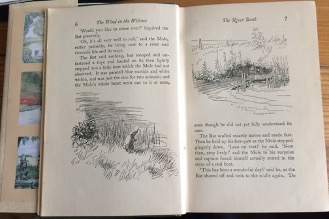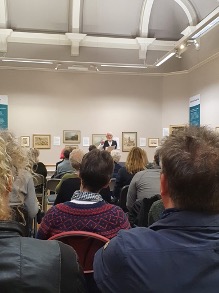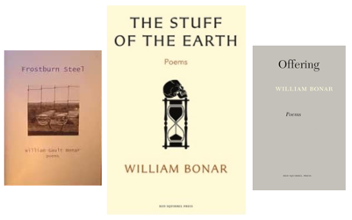.
In 1952 I was given a book for my 8th birthday. It became one of my favourite stories. I’ve still got it, though I’ve had to rebind. It’s had some hard wear. It’s The wind in the willows which starts, as well you know, with the Mole, doing his spring cleaning and feeling the pull of Spring even in “his dark and lowly little house” which it penetrates “with its spirit of divine discontent and longing”. Amazingly, even at 8 I instinctively ignored the Edwardian whimsy and turned the page to find the Mole dancing for the sheer joy of being outside. Two pages later he’s standing at the boundary between his quotidian locked-down world and the world of story where anything can happen. And then does.
.

Over a week ago I knew just how he felt. Like too many others I’ve been (as I keep on saying in this blog) shut in and shielded for two years and more. I’ve grown nervous of the company of strangers. Timid is as close as I can get to describing it. How I’ve missed the buzz! I tried to write about it…the nearest I got was this.
31|01|2021
.
Last day of January
In the last days all days are the same;
we have no way of recognising endings.
.
Somewhere it’s the last day
of someone’s sentence, let out
in a world locked down, hedged
with prohibitions that no-one
can explain.
.
Daffodils don’t care,
push up bruise-blue in the field
that’s waterlogged and frozen.
.
The apple tree’s still full of fruit,
blackbirds hollow out the fallen.
Up in the hawthorn a thumbprint
of feathers is filling the sky
with a song so complex you could weep.
.
A blackbird triggers his alarm.
That big white cat’s out in the field.
.
Somewhere out of sight the sun
is setting beyond the windfarm
on the whaleback moor.
.
Last day of January. You have run out
of timber. You want to fettle everything.
.
What the small bird wants
is extraordinarily complicated.
.
That blackbird built his first nest
last year and sang himself to silence.
You hope he’ll try again.
You can wait the year out.
You’ve done it before.
.
Well, I was really chuffed when this was published in The North .67 and finally in my new collection Pressed for time. Which brings me back to May 3rd when we had a live launch for the collection in the lovely venue which is Brighouse Library and Art Gallery . For a week before, I was awake nights wondering if it was true, and if, because I’d done it before I could still do it. I was absurdly nervous about the whole thing, apart from the usual business of wondering whether anyone would turn up. I was nervous enough to write a script for my bits of the reading. These days I’m usually in bed by 9.00pm. Would I have the energy? I haven’t read aloud to a live audience for two years and more…….and so on.
.

[Photo courtesy of Kim Moore]
What actually happened was that twelve Calder Valley Poets rocked up to do support readings; former students and ex-colleagues from the 1970s (Northern Counties College) and 1980s (Boston Spa Comp) turned up out of the blue; poets and friends I’ve not seen in yonks came along; eldest son, daughter in law and grandson came along (and filmed it all); we sold a shed-load of books. It all went like clockwork thanks to my editor Bob Horne’s careful planning. To top it all, my friend, mentor and inspiration Kim Moore arrived (a five hour round trip from Barrow!) and read three of my poems from the collection, so I heard them as if I’d never encountered them before. Wow!
Nervous? The script went out of the window. I’d forgotten what a live audience can do. I’d forgotten how it feels, the buzz, to be flying. There’s an electricity that energises you, that overrides two years of lockdown and chemo, and I thank my stars for it. I was reading a Facebook post today from Gill Lambert, the Leeds/Airedale poet who launched her new collection A small goodbye at dawn in Haworth. She’s flying, too. Suddenly there are launches everywhere. We’ve been let out. We know how the Mole felt. We’re learning the synergy and language of company again, the sound of voices.
Which brings me to the second part of the post. There’s a phrase that’s stuck in my head since the early 80s when I heard a lecture by an American “Real Books” educationist. I can’t remember his name. Mea culpa. It was a catchphrase taken up by the English ‘Real books’ enthusiast, the Literacy lecturer Geoff Hynds.
You learn from the company you keep
Oversimplified and politicised by the eduation Right Wing, this came to be villified as the idea that children would learn to read if they were left unhindered with lots of books. A bit like claiming you could learn retail theory by being left in a shop, or dietetics by eating a lot. No-one ever advocated anything of the kind, of course. But core truth is that you learn best and longest from the company you keep. It’s not necessarily a good thing, as demonstrated by our PM, but true nevertheless. You learn to perform poems by performing, but you need responsive audiences. And you learn to write poetry blogs by keeping company with people who do it better. I’ve become introspective in the last two years, and needed the good old kick up the pants reminder of why I started this blog in the first place…to share my enthusiasm for poets who excited me. Well, I got that last week when a friend sent me a link to The Friday Poem ( https://the fridaypoem.com ) and an article by poet Regina Weinert (who has been a cobweb guest before now)
.

It’s an appreciation of a poet I didn’t know about and now want to know more of. William Bonar was born in Greenock and grew up in the neighbouring shipbuilding town of Port Glasgow. He graduated from the Universities of Edinburgh and Strathclyde and gained a distinction on the MLitt in Creative Writing at Glasgow University in 2008. After working in education for 30 years he retired to become a full-time writer, becoming a founder member of St Mungo’s Mirrorball, Glasgow’s network of poets and readers of poetry, and was a participant on Mirrorball’s Clydebuilt mentoring scheme (2009-10) under the tutelage of Liz Lochhead. His sequence, ‘Visiting Winter: a Johannesburg quintet’, originally published in Gutter 06, was chosen for the Scottish Poetry Library’s online anthology Best Scottish Poems 2012 and he was shortlisted for a Scottish Book Trust New Writers Award in 2015. He published two pamphlets: Frostburn Steel (Dreadful Night Press, 2004) and Offering (Red Squirrel, 2015) which won the James Kirkup Memorial Poetry Prize for 2014.
Billy died in September 2021 and the William Bonar Pamphlet Prize, supported by St Mungo’s Mirrorball and Red Squirrel Press, was founded in his memory.
A collection of poems The Stuff of the Earth was published in 2021.
Regina’s appreciation of a poet who was a friend and inspiration is everything I want in writing about poets and poetry. Jim Carruth has written on Offering that
“You cannot help but trust a poet who treasures the briefest moments in his journey,
and works them back to the very essence that will keep them bright always.”
It might be the bleak moment that draws you in, and takes you though bleakness and out the other side.
Regina provides part of the backstory:
“Four poems deal directly with William Bonar’s own experience of illness and near-death. It was important to him to be open around this and he contributed poems to the anthology Living our Dying. The poems are unsparing, almost clinical, yet also calm and not without humour. In ‘Awake’ he wonders whether it was the “two-tone hooting of owls” that woke him, “penetrating my ear like a bolus of ice-water”, or whether it was the full moon, “whatever”:
I must face that brilliant eye endure
its lunatic indifference
Once you hear that, you can’t forget it for its utter clarity. And clarity is what Regina Weinert gives you. She’s taught me how to properly read ‘spaced’ poems, which are all the go, and to understand the difference between playing around and the real deal. Here’s an extract to explain what I mean:
“[This poem] illustrates many features of William Bonar’s work. It situates the person and the poet subtly and firmly, foreclosing nothing. It has his signature spacing, which never becomes a mannerism, as it is always in step with sound, rhythm, image and content. It also shows his skill in inserting concepts that anchor a poem.
The Early Days of a Better Nation
.
once the weather suiting
the architecture I caught
The Modern crystalline
.
as pure water it must have been
June pupils gone
I walked a glass-walled corridor
.
a man in a movie alone
geometry and sky
at home with possibility
.
The poem directs the reading pace. Line breaks perch on the edge of things. The speaker pauses, deliberates; chooses the appropriate expression, the right time, the fitting comparison.
[and]
despite the grand scheme, we still have this one man who is maybe just looking forward to the holidays and a bright day is making him feel optimistic. “
That’s how she writes, how she deftly directs your attention to where it belongs. I want to write as clearly as that. And another thing. It struck me as I read the article, and as I checked out more of William Bonar’s work, that his friendship and his poems had an impact on Regina’s own (apparently) cool and spare poems. I asked her about it. Here’s what she said:
“It’s interesting about influences and how they work, at a slant. Billy and I share a preference for writing short or condensed poems. I got his poems, or rather his poems got me, instantly. It is how I wrote before I knew his work , but now I go back to his poems to try and up my craft. It’s not a direct route. It’s more to do with trying to widen and deepen a poem, to reach the essence, whatever that is – to be better at listening, is maybe what I’m saying. MacCaig was the first poet I read where I thought, that’s how poems can be! I felt such a lift. Decades before I ever wrote a poem. “
Like I say. We learn from the company we keep, and my words, haven’t I missed that face to face, in-the-flesh company, these last two years.
Thank you, Regina for teaching me about listening properly.
PS.
I’ve posted six trailers and teasers from Pressed for time. Here’s one more – it’ll be the last . One for a cool wet April and May, perhaps.
.
A Furious Drench
The erth was voyde and emptie and darcknesse was vpon the depe
.
There was rain in the ancient woods
of Inverdalavil; birds stopped
singing, rain hushing leaf and branch;
the way small burns bunched and muscled up,
the sound of big stones on their beds,
the way a big old ash came spinning
and dipping on a peat-thick foamy wave,
racing down the valley and out to sea,
to grow waterlogged, and drown.
.
Than sayd God to Noe….behold I wil bringe in a floude
of water apon the erthe to destroy all flesh from under heauen
.
There was rain that fell in one great lump
on dried-up cottongrass moors, ran off
in bright sheets down the flanks
of small tight valleys, gathered pace,
scoured through the estates and streets
of Mixenden and Illingworth, sluiced
in a shining wall off the stilted road
above Dean Clough on to the old road
where a man in the pub below stepped
out to see what all the roaring was,
saw a car float past and another and then
he was up to his knees and off his feet,
tumbled in the mad waters, down
into the beck in its cold, boiling canyon,
into its culverts and tunnels with litter bins
and broken things.
.
In the seconde moneth … were all the founteynes of the depe
broken up and the wyndowes of heauen were opened
There is rain that ghosts of flood
remember where they mutter in the branches
of alder and willow – fertiliser sacks,
black binbags, sodden clots of leaf,
slick and sour as asphalt, morning-after breath;
skips of rancid sofas, leaking fridges,
laminate and lino. Rain inexhaustible
on sopping land that can take no more,
fattening rising rivers, filling cellars,
downstairs rooms, creeping up and up;
fat brown rivers easing out of bounds,
floodplain, estuary, and at the last, the sea,
the whole world become wave and waste.
.
and the spirite of God moved vpon the water
.
One last thing about the book. I planned to sell it P&Pfree until May14. That’s now extended to the end of June. Get yours now while copies last. Just go to My Books at the top of the post
See you again before too long. I’ll be writing about other poets. I’ve had enough of introspection.